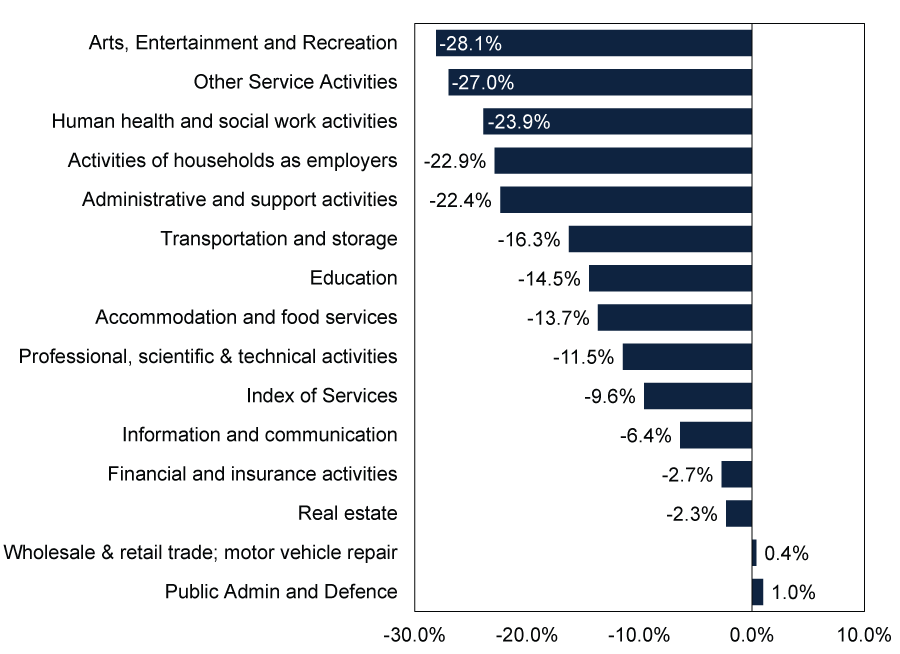Personal Wealth Management / Economics
Our Perspective on the UK’s August Slowdown
A deeper data dive finds some encouraging nuggets, in our view.
The UK released monthly gross domestic product (GDP, a government-produced estimate of economic output) for August last Friday, and with growth slowing from July’s 6.4% m/m to 2.1%, most headlines we encountered focused on the seemingly fizzling recovery.[i] With growth cooling and new restrictions in local COVID hotspots already starting to bite—whilst GDP remains -9.2% below its pre-pandemic peak in February—many financial commentators we follow warn the road ahead will be long and arduous.[ii] We won’t argue everything from here will be smooth sailing, especially with the limits on activity announced on Monday. But when digging into the data, we found some interesting tidbits indicating the UK’s economic foundation is a lot stronger than many commentators give it credit for and—for better or worse—reopenings and restrictions likely remain the swing factor. That doesn’t necessarily make life easier for investors, since these are inherently unpredictable political decisions, but we think it does suggest weak economic fundamentals aren’t reason to shun UK shares.
The first interesting nugget comes from page three of the Office for National Statistics’ press release for August monthly GDP: “The accommodation and food services sub-sector contributed 1.25 percentage points to the 2.1% growth in GDP for August 2020, as the combined impact of easing lockdown restrictions, Eat Out to Help Out Scheme and ‘stay-cations’ boosted consumer demand.” Now, pessimists could logically read this and scoff that GDP was artificially inflated by government largesse, and if it can’t even grow well without the government picking up the tab when people dine out, then things must be dire indeed. As people who generally think most sustainable growth comes from the private sector, we won’t try to talk readers out of that general viewpoint if they hold it. But we think there is another way to view this without casting judgment for or against Eat Out to Help Out: People went out, full stop. As the UK and other nations started reopening in late spring and early summer, the big worry we saw throughout the financial news was that society’s fear of COVID-19 would keep people home and out of restaurants, sapping reopening’s power to generate an economic recovery. Indoor dining was supposedly the most vulnerable to this. But we think August’s results prove that decisively false. Setting aside quibbles over who picked up the tab, we think the simple fact people actually felt comfortable leaving the house and lingering at their local watering hole suggests that whole notion of psychological scarring causing economic scarring was off base.
The second set of fun facts comes from page five of the press release, which looks at Services’ 14 sub-sectors. Of those 14, 12 remain below pre-COVID output levels, which we don’t find surprising. But we were rather struck by which industries are struggling the worst. As Exhibit 1 shows, that includes all the items we wouldn’t rationally expect to recover until the virus is old news and no longer threatens the masses. Stuff like air travel. Rail transport. Entertainment. Elective health care. Paid domestic work. These are all largely still offline. Whatever your opinion of the merits of this, until life on these fronts returns to normal, these areas will likely remain sore spots. But when they do reopen, we think August’s hospitality boom suggests they can recover a lot faster than people might expect.
Exhibit 1: Services and Its 14 Sub-Sectors’ Cumulative Growth Since February

Source: Office for National Statistics, as of 9/10/2020. Cumulative growth in the Index of Services and its sub-sectors, February 2020 – August 2020.
Now, in our view, none of this means equities can’t continue their recovery. Our research has long shown equity markets tend to look about 3 – 30 months out. In young bull markets (prolonged periods of generally rising share prices), we think markets tend to look to the far end of that range. Therefore, in our view, what matters most is that markets can have a reasonable, rational expectation that within the next two to three years, life will likely be back to normal. Not just office workers, but the baristas, in-home caregivers, estheticians, shop owners and all other service workers and business owners that depend on in-person commerce. With vaccine progress continuing apace, according to the many reports we see daily, we think markets are correctly signalling that this outcome is likely.
In the meantime, however, fits and starts in the reopening process could prompt short-term volatility. A second global lockdown as bad as (or worse than) the first could sow panic. But our research shows markets move most on probabilities, not possibilities. So watch carefully for that distant bad possibility, but we don’t think positioning for it today makes sense—not with most indicators we see pointing to recovery and new restrictions much more limited than round one was. To us, today is the epitome of a time to think like markets and focus on the probable future we face.
Get a weekly roundup of our market insights.
Sign up for our weekly e-mail newsletter.

See Our Investment Guides
The world of investing can seem like a giant maze. Fisher Investments UK has developed several informational and educational guides tackling a variety of investing topics.




